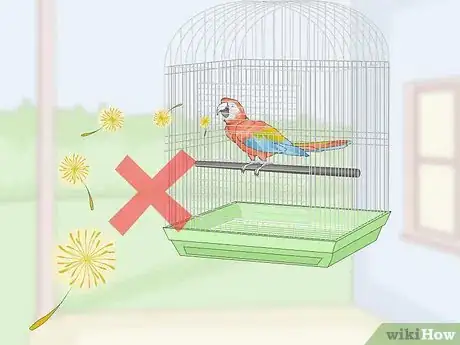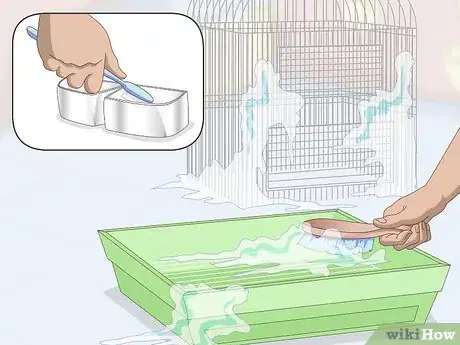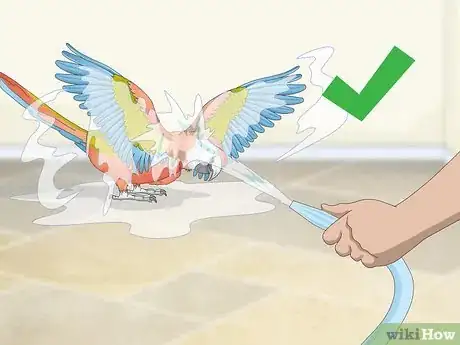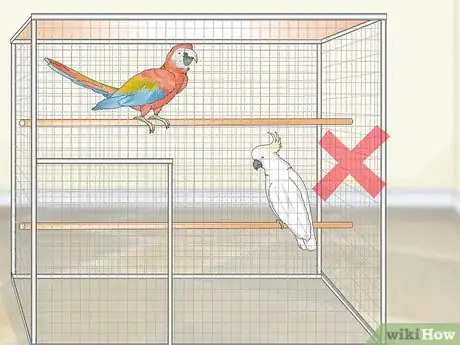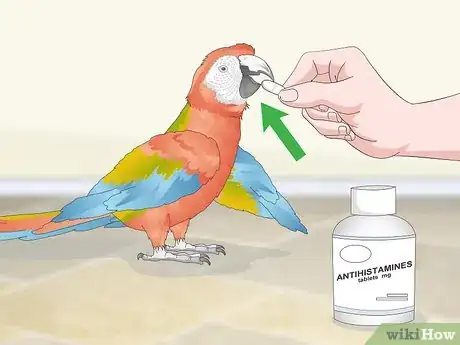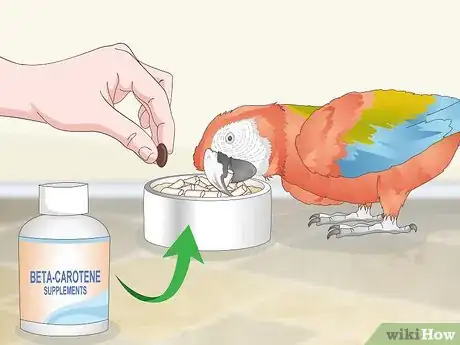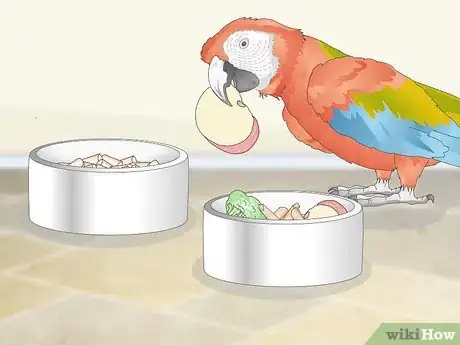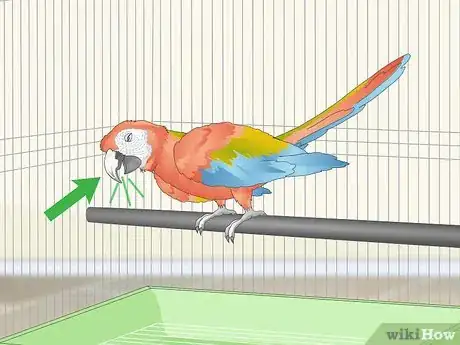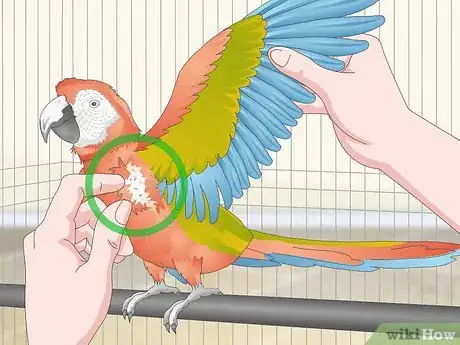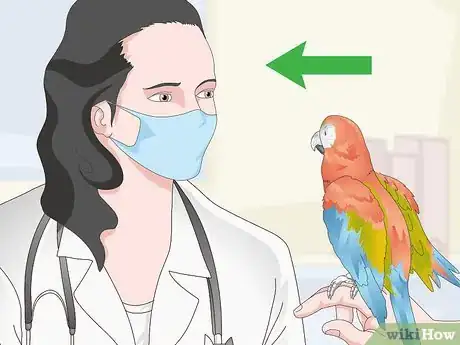This article was co-authored by Pippa Elliott, MRCVS. Dr. Elliott, BVMS, MRCVS is a veterinarian with over 30 years of experience in veterinary surgery and companion animal practice. She graduated from the University of Glasgow in 1987 with a degree in veterinary medicine and surgery. She has worked at the same animal clinic in her hometown for over 20 years.
This article has been viewed 9,801 times.
Macaws, like humans and other pets, can develop allergies. These can be seasonal allergies associated with airborne pollens and dust or food allergies. In order to treat allergies in macaws, you will first need an avian vet to identify and diagnose the allergy. Then, you can reduce the birds exposure to allergens in their environment or treat and prevent allergies through medication and diet. The best way to treat allergies among macaws is to eliminate the exposure to the allergen.
Steps
Reducing Allergens in their Environment
-
1Avoid exposure to allergens. Keep your bird in a clean environment away from any possible allergens. For example, your macaw may have seasonal allergies associated with pollen and mold. The best way to treat allergies is to avoid exposure to allergens as much as possible.
- Similarly, if your bird has been diagnosed with a food allergy, stop feeding them that type of food.
- Some macaws seem to be sensitive to powder down from other birds. If your macaw appears to be having this reaction, move its cage away from any other birds you might have.
-
2Install air filters. Prevent allergens from impacting your bird by keeping the air clean. A good quality air filter with HEPA filtration can help remove dust and dander from the air and ensure your macaw isn't affected by airborne allergens.Advertisement
-
3Keep the cage clean. Clean their water and food dishes daily. You should also wipe down all perches, toys, and the floor of the cage weekly. At least once a month, you should totally disinfect and clean the entire enclosure. This will help to remove bacteria and allergens from your macaws habitat.[1]
-
4Bathe your bird regularly. Always ensure that there is a bird bath available for your macaw inside their enclosure. This way they can wash and groom themselves. You should also wash your macaw using a spray hose to remove any dust or dander. This can reduce their exposure to certain allergens.[2]
-
5Do not house macaws with cockatoos. Cockatoos are dusty birds that collect a lot of dander and dust in their feathers. Many macaws are allergic to cockatoos and should not be kept in the same enclosure or within close proximity to macaws.[3]
- If you have macaws and cockatoos, keep them in separate rooms.
Treating Allergies with Diet and Medication
-
1Give your macaw prescribed antihistamines. In some cases antihistamines can be useful for treating allergies among macaws, however, you should not administer an antihistamine unless it has been prescribed by your veterinarian. Antihistamines reduce the clinical symptoms associated with a number of allergies.
- In order to administer an antihistamine to your macaw, follow all of the instructions provided by your vet.
- Both oral and topical antihistamines can be used to treat allergies in birds.[4]
-
2Give your macaw vitamin A. You can prevent and minimize allergies by feeding your bird vitamin A either through their regular diet or in supplements. Vitamin A helps to line the mouth, gastrointestinal tract, and lungs and maintain proper functioning of the respiratory system. This can boost the immune system in your bird and will help to prevent allergies.
- Beta-carotene supplements are an excellent way to ensure your macaw has enough vitamin A in their diet.
-
3Feed your macaw a healthy diet. A well-rounded and healthy diet can improve the functioning of your macaw’s immune system. This will help to prevent secondary infections from taking place as a result of seasonal allergies. For example, some macaws may develop respiratory infections or asthma.
- Feed your macaw ½-¾ of a cup of parrot mix and ½-¾ of a cup of fruits and vegetables daily.[5]
- Some fruits and vegetables to feed your macaw include, apples, pears, plums, cherries, mangos, berries, carrots, sweet potatoes, and cucumbers.
Diagnosing Allergies in Macaws
-
1Watch for sneezing and/or nasal discharge. Many macaws will develop seasonal allergies that will impact their respiratory system. For example, your bird may be allergic to pollen resulting in sneezing or nasal discharge. Although some sneezing is normal, excessive sneezing and discharge may be a sign of an allergic reaction.[6]
- Sneezing could also be caused by another health issue, such as a respiratory infection. If your bird is sneezing frequently, visit an avian vet to make sure that it’s not something more serious.
-
2Look for skin irritations. Skin allergies in macaws can manifest as swelling, itchiness, redness, feather loss, or fluids oozing from the skin or feather follicles. If you notice any of these symptoms, it could suggest that your macaw has an allergy to a substance in their environment.[7]
- Itchiness may be a symptom of a more serious health problem, like parasites. Be careful not to assume that your your bird just has allergies. Instead, take it to a vet to get an official diagnosis.
-
3Take your macaw to the vet. If you notice any symptoms related to allergies, you should take your macaw to an avian vet for a thorough inspection. Your vet will likely ask you a number of questions concerning your macaw’s medical history and habitat in order to determine the cause of the symptoms. If an allergy is suspected the vet will provide you with instructions to treat or reduce the symptoms associated with the allergen.
Warnings
- Some allergies can be difficult to diagnose in macaws. It may take a process of trial and elimination to pinpoint the exact source of the allergy.⧼thumbs_response⧽
References
- ↑ http://animal-world.com/encyclo/birds/macaws/MacawProfile.htm#Macaw Habitat
- ↑ http://animal-world.com/encyclo/birds/macaws/MacawProfile.htm#Macaw Habitat
- ↑ http://www.petplace.com/article/birds/general/when-your-bird-is-sick/most-common-diseases-of-blue-and-gold-macaws
- ↑ http://www.exoticpetvet.net/avian/allergies.html
- ↑ http://animal-world.com/encyclo/birds/macaws/MacawProfile.htm#Macaw Habitat
- ↑ http://www.petplace.com/article/birds/general/when-your-bird-is-sick/most-common-diseases-of-blue-and-gold-macaws
- ↑ http://www.exoticpetvet.net/avian/allergies.html
About This Article
To treat allergies in macaws, start by taking your bird to an avian vet to determine the cause of the allergies and learn about treatment options. Your vet may prescribe oral or topical antihistamines for your macaw to reduce the symptoms. Next, prevent as much exposure to the allergens as possible by keeping your macaw's cage clean, installing air filters in your home, and bathing your bird. Then, make sure to feed your bird a well-rounded and healthy diet to improve its immune system! For more tips from our Veterinary co-author on maintaining a healthy environment for your macaw, read on!
